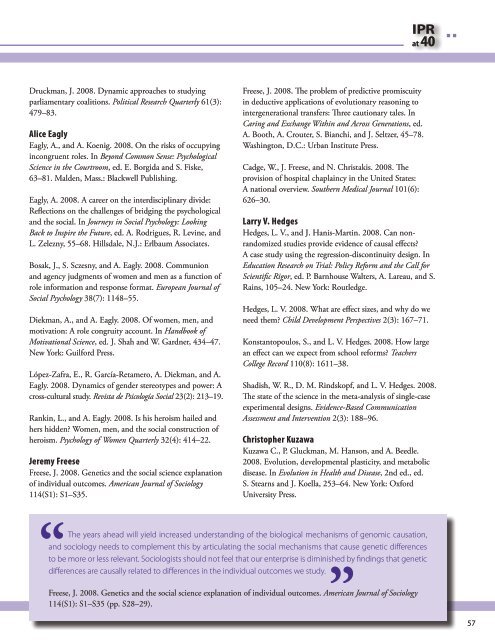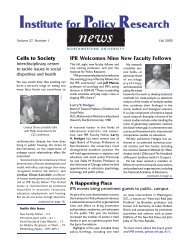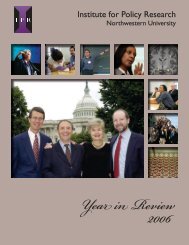IPR - Institute for Policy Research - Northwestern University
IPR - Institute for Policy Research - Northwestern University
IPR - Institute for Policy Research - Northwestern University
You also want an ePaper? Increase the reach of your titles
YUMPU automatically turns print PDFs into web optimized ePapers that Google loves.
<strong>IPR</strong><br />
at 40<br />
Druckman, J. 2008. Dynamic approaches to studying<br />
parliamentary coalitions. Political <strong>Research</strong> Quarterly 61(3):<br />
479–83.<br />
Alice Eagly<br />
Eagly, A., and A. Koenig. 2008. On the risks of occupying<br />
incongruent roles. In Beyond Common Sense: Psychological<br />
Science in the Courtroom, ed. E. Borgida and S. Fiske,<br />
63–81. Malden, Mass.: Blackwell Publishing.<br />
Eagly, A. 2008. A career on the interdisciplinary divide:<br />
Reflections on the challenges of bridging the psychological<br />
and the social. In Journeys in Social Psychology: Looking<br />
Back to Inspire the Future, ed. A. Rodrigues, R. Levine, and<br />
L. Zelezny, 55–68. Hillsdale, N.J.: Erlbaum Associates.<br />
Bosak, J., S. Sczesny, and A. Eagly. 2008. Communion<br />
and agency judgments of women and men as a function of<br />
role in<strong>for</strong>mation and response <strong>for</strong>mat. European Journal of<br />
Social Psychology 38(7): 1148–55.<br />
Diekman, A., and A. Eagly. 2008. Of women, men, and<br />
motivation: A role congruity account. In Handbook of<br />
Motivational Science, ed. J. Shah and W. Gardner, 434–47.<br />
New York: Guil<strong>for</strong>d Press.<br />
López-Zafra, E., R. García-Retamero, A. Diekman, and A.<br />
Eagly. 2008. Dynamics of gender stereotypes and power: A<br />
cross-cultural study. Revista de Psicología Social 23(2): 213–19.<br />
Rankin, L., and A. Eagly. 2008. Is his heroism hailed and<br />
hers hidden? Women, men, and the social construction of<br />
heroism. Psychology of Women Quarterly 32(4): 414–22.<br />
Jeremy Freese<br />
Freese, J. 2008. Genetics and the social science explanation<br />
of individual outcomes. American Journal of Sociology<br />
114(S1): S1–S35.<br />
Freese, J. 2008. The problem of predictive promiscuity<br />
in deductive applications of evolutionary reasoning to<br />
intergenerational transfers: Three cautionary tales. In<br />
Caring and Exchange Within and Across Generations, ed.<br />
A. Booth, A. Crouter, S. Bianchi, and J. Seltzer, 45–78.<br />
Washington, D.C.: Urban <strong>Institute</strong> Press.<br />
Cadge, W., J. Freese, and N. Christakis. 2008. The<br />
provision of hospital chaplaincy in the United States:<br />
A national overview. Southern Medical Journal 101(6):<br />
626–30.<br />
Larry V. Hedges<br />
Hedges, L. V., and J. Hanis-Martin. 2008. Can nonrandomized<br />
studies provide evidence of causal effects?<br />
A case study using the regression-discontinuity design. In<br />
Education <strong>Research</strong> on Trial: <strong>Policy</strong> Re<strong>for</strong>m and the Call <strong>for</strong><br />
Scientific Rigor, ed. P. Barnhouse Walters, A. Lareau, and S.<br />
Rains, 105–24. New York: Routledge.<br />
Hedges, L. V. 2008. What are effect sizes, and why do we<br />
need them? Child Development Perspectives 2(3): 167–71.<br />
Konstantopoulos, S., and L. V. Hedges. 2008. How large<br />
an effect can we expect from school re<strong>for</strong>ms? Teachers<br />
College Record 110(8): 1611–38.<br />
Shadish, W. R., D. M. Rindskopf, and L. V. Hedges. 2008.<br />
The state of the science in the meta-analysis of single-case<br />
experimental designs. Evidence-Based Communication<br />
Assessment and Intervention 2(3): 188–96.<br />
Christopher Kuzawa<br />
Kuzawa C., P. Gluckman, M. Hanson, and A. Beedle.<br />
2008. Evolution, developmental plasticity, and metabolic<br />
disease. In Evolution in Health and Disease, 2nd ed., ed.<br />
S. Stearns and J. Koella, 253–64. New York: Ox<strong>for</strong>d<br />
<strong>University</strong> Press.<br />
“<br />
The years ahead will yield increased understanding of the biological mechanisms of genomic causation,<br />
and sociology needs to complement this by articulating the social mechanisms that cause genetic differences<br />
to be more or less relevant. Sociologists should not feel that our enterprise is diminished by findings that genetic<br />
differences are causally related to differences in the individual outcomes we study.<br />
”<br />
Freese, J. 2008. Genetics and the social science explanation of individual outcomes. American Journal of Sociology<br />
114(S1): S1–S35 (pp. S28–29).<br />
57
















